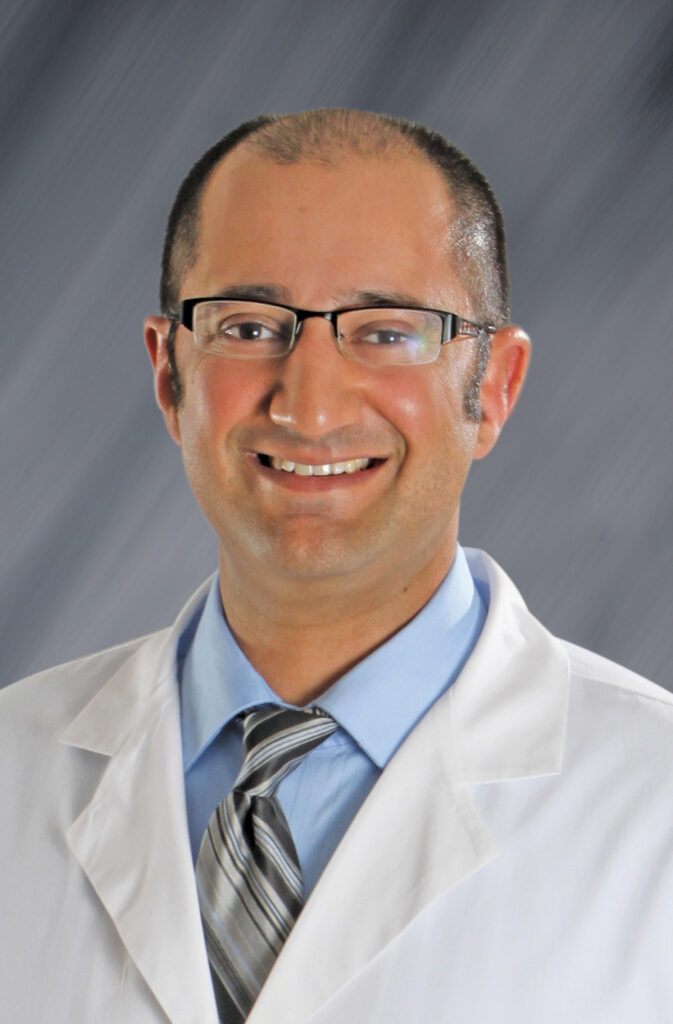Dealing with a diminished quality of life is daunting. Whether from stroke, traumatic brain injury, spinal cord injury, amputation, hip fracture or other injury or illness, getting the right rehabilitation plan is critical for any patient.

Franciscan Health’s acute rehabilitation program has streamlined the “next-step” process for patients so they can focus on what’s most important post injury or illness—taking back their quality of life and returning home. Their process doesn’t stop at their hospital either.
“We focus on lifetime care,” said Sachin A. Mehta, MD, Medical Director- Neuro-Rehabilitation. “That is one of the most unique qualities of our program at Franciscan Health. We can help transition an individual from injury to post-acute care, to home, and then to life-long checkups and continuing rehabilitation care if needed. Simply put, the patient stays within one hospital system and with a multidisciplinary team who provides an integrated care approach for life,” he added.
Dr. Mehta strongly believes that rehabilitation across the entire post-acute spectrum is an ideal way to treat all patients who have suffered devastating injuries or illnesses. He explains the progression of the program like this. When a patient is first admitted into the hospital, the rehabilitation team is available as consultants to the attending physicians and oversee the rehabilitation part of care until the patient is transferred to the inpatient rehabilitation unit.
This multidisciplinary team made up of physical, occupational and speech therapists, case managers, rehabilitation nurses and doctors, and other specialists, all work together to help the patient improve their quality of life and function with the ultimate goal of regaining their ability to return home and independence.
“Our team of therapists really put their full heart into helping our patients. They provide 15 hours of rehabilitation per week or three hours per day, so they develop a very good understanding of the progress the patient is making,” said Dr. Mehta.
Dr. Mehta, who has been with Franciscan Physician Network since 2009, is a big advocate of working as a team and feels like outcomes for patients are better with this multi-disciplinary approach. Staff hold a weekly team conference where the entire team meets and discusses what’s going well, what’s not going well or any barriers that are keeping the patient from improving their functional abilities.
This treatment model has been so successful on the acute inpatient side that Franciscan Health has incorporated a similar process into the outpatient rehabilitation day-program and within the skilled nursing facility programs where they currently provide rehabilitation consultation at three different facilities. This approach allows the team to regularly speak with the rehabilitation teams at the skilled nursing facilities to discuss what can be changed medically or from a rehabilitation standpoint to allow a patient to continue to progress and transition home.
“That’s where I think other organizations struggle,” said Dr. Mehta. “After rehab there is, rightly so, a focus on stabilizing co-existing medical conditions such as high blood pressure or diabetes or determining what caused the initial stroke for example. However, a patient’s quality of life and function are often neglected, and patients don’t keep up with the progress they made on inpatient rehabilitation. Franciscan Health does a great job of ensuring that patients don’t fall through the cracks during continued rehabilitation care.”
Dr. Mehta adds that many patient’s situations require months or even years of progressive rehabilitation and the focus on recovery cannot stop two weeks after their injury.
“I am so passionate about our program and our great outcomes and so proud to work with this incredible team that I want everyone to know about it,” he said. “Our acute inpatient rehabilitation program at Franciscan Health is really a community gem,” said Dr. Mehta. The unit has 22 beds attached to the hospital. The benefits of being attached to the hospital versus a freestanding rehabilitation facility is the direct access patients have to labs, radiology and specialty physicians if the need arises, he explained.
Acute inpatient rehab is a very individualized program with specific focus on a patient’s needs and the living situation at home. Patients stay an average of two weeks on the acute rehabilitation unit. At discharge, 80-85% of patients transition home and about 10% transition to a skilled nursing facility to continue their rehab. For those going home, the outpatient day program is critical and allows the patient to continue getting physical, occupational and speech therapy three hours a day, a couple of days a week.
Dr. Mehta reemphasized that what makes this program really special is that even after a patient returns home, they continue to follow-up with rehabilitation services, either with outpatient therapy or home therapy, and continue the connectivity with rehabilitation doctors who essentially see them lifelong.
If during these lifelong check-ins, a decline in function is noted, the patient can go back into the outpatient day rehabilitation program to work on their progress and receive an upgrade to their home exercise plan.
“Franciscan Health Indianapolis really does provide exceptional post-acute rehabilitation services during the patients’ recovery, and it’s an amazing resource for our community,” said Dr. Mehta.
